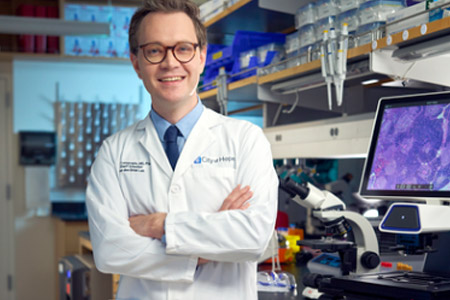A team of international researchers led by scientists at City of Hope, one of the largest and most advanced cancer research and treatment organizations in the United States, with its National Medical Center in Los Angeles ranked among the nation’s top 5 cancer centers by U.S. News & World Report, have demonstrated a way to boost thymic function after damage in preclinical studies.
The team’s study results, published today in the journal Immunity, outline their discovery of a specific type of regulatory T cell that can home back into the thymus and repair the organ when it's damaged.
Between the lungs and in front of the heart sits a small gland called the thymus that wields incredible power over human health by producing T cells, key components of our immune system. In cancer patients, certain therapies — along with aging and stress — can deplete T cell output, leaving individuals susceptible to infection and additional disease.
“Our discovery — the regulatory T cell recirculation back to the thymus — promotes repair through a process that hasn't been described before and represents a novel pathway to regeneration in the gland,” said lead author Andri Lemarquis, M.D., Ph.D., staff scientist and group leader of the thymus research program in the laboratory of Marcel van den Brink, M.D., Ph.D., president of City of Hope Los Angeles and National Medical Center, Deana and Steve Campbell Chief Physician Executive Distinguished Chair and senior author of the paper. “The findings open up a new translational angle for addressing thymic fatigue and damage.”
The Role of the Thymus
Over a lifetime, the human body faces a wide variety of threats from bacteria, viruses and other dangers, such as cancer. T cells, made by the thymus, fight pathogens and malignancies through direct attack or by teaching other immune cells how to remove threats.
“Because there are so many different threats out there, we need an incredible diversity of these soldiers, or immune cells, to defend us,” explained Dr. Lemarquis. “But we also need some kind of control, so we don't get a civil war in our body, like an autoimmune disease. This requires a school to teach these cells to protect us and that school is the thymus.”
Unfortunately, the thymus is highly susceptible to injury caused by stress, infections, aging and cancer therapies.
“If you receive cancer therapies, your thymus is going to shrink,” said Dr. Lemarquis. “Without some help to grow again, patients won't get what's called immune reconstitution, in which new protective T cells are produced. Our work is trying to boost the thymus in patients who might lose this basic protection.”


